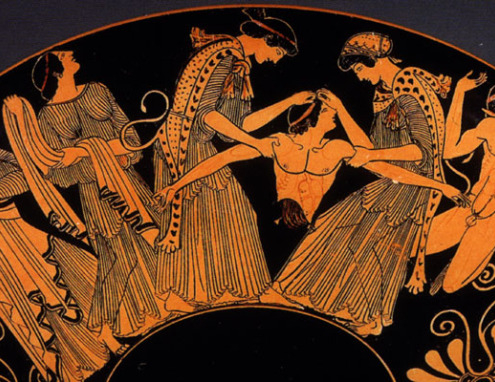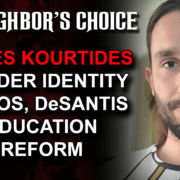The Tragedy of Donald Trump (A Literary Analysis of The Trump Presidency)
INTRODUCTION
This past week Donald Trump made history by being the first president to be, not only impeached twice, but also to be acquitted of impeachable offenses twice.
These recent events that have unfolded have made a lot of Americans upset who feel that President Trump should come to justice for inciting an “insurrection” against the American government.
There are a few patterns I have seen throughout the entire Trump presidency and I believe those patterns have led us to what I can only consider as scapegoating of Trump which I find to be a tragedy, not as in a disaster, but more in the literary sense.
So what I want to do is consider the literary roots of tragedy and scapegoating, introduce you to René Girard’s mimetic theory, and analyze the presidency of Donald Trump with this framework.
TRAGEDY AND GREEK MYTHS
THE ORIGIN OF THE WORD TRAGEDY
Think about the word tragedy for a moment.
The etymology (origin) of tragedy is the Greek word tragōidia. This word is a combination of the two Greek words tragos ‘goat’ and ōidē ‘song’.
Quite literally the word tragedy is “goat song”.
Isn’t that weird? Some suggest that the term goat song could be in reference to satyr-plays that were performed during the Festivals to Dionysus (Dionysia) of Ancient Greece.
During the Dionysia three tragic plays would be performed to honor the god of debauchery Dionysus.
THE IMPORTANCE OF DIONYSUS TO TRAGEDY
In Ancient Greek myth the god Dionysus was the god of wine and debauchery, but there is another part of his mythos that is rarely mentioned outside of scholarly circles and that’s the story of his dismemberment by the Titans by the order of Hera (wife of Zeus).
Zeus cheated on his wife Hera with a mortal woman (I feel most Greek myths start this way), and Dionysus was the result, but before his birth Hera ordered the mortal woman to be killed so Zeus saved Dionysus’ life by hiding him in his thigh.
As Dionysus grew into a child, Hera still wanted him dead and so ordered him to ripped apart and devoured by the Titans. His heart was preserved by the goddess Athena and from that Zeus resurrected him into a god.
As part of Dionysian worship an animal is viciously ripped apart and sacrificed to Dionysus in order to retell his death and resurrection.
In the tragic play The Bacchae the King of Thebes, Pentheus, is ripped apart by the Bacchae (followers of Dionysus) because of his denial of Dionysus’ deity.
Dismemberment was central to Dionysian ritual, along with debauchery and wine and Satyrs (half-goat, half-men in Greek myth) that were also associated with debauchery and wine and mischief and therefore connected to Dionysus.
At the Dionysia “goat songs” or “satyr-plays” were performed in honor of the tragic divinity of Dionysus.
Another important part of these “goat songs” was the sacrificing of goats before the festival and after the festival.
OEDIPUS REX AND THE SCAPEGOAT
There’s a theme forming here, that of goats, but more specifically the scapegoat.
If you’ve never read Oedipus The King by Sophocles, it’s the story of Oedipus the King of, curiously enough, Thebes. A plague has befallen the city of Thebes and the city is wondering what Oedipus is doing about it.
Oedipus has sent someone to the Oracle to see why the plague has fallen on his city, and the Oracle reveals that the plague is because the murderer of the former King of Thebes has taken residence in the city. So in order to get rid of the plague Oedipus needs to rid his city of this murderer.
Turns out the murderer was Oedipus himself. After finding out the truth Oedipus gouges out his eyes and exiles himself from the city freeing them of their affliction.
In the tragedy, Oedipus Rex, Oedipus is seen as a pharmakos, where we derive our English word pharmacy. Pharmakos is also another Greek ritual where a single person stands in the gap for the entire plague stricken community. Another term we can use for pharmakos is scapegoat.
Oedipus is a quintessential scapegoat.
French anthropologist René Girard believes that, what he calls, “the scapegoat mechanism” permeates, not only ancient cultures but also, our current culture.
SCAPEGOATS AND YOU
In the book of Leviticus, God lays out a ritual that the people are supposed to take part in during Yom Kippur (The Day of Atonement). Yom Kippur is the day where all of the Jewish people are forgiven of their sins that have accumulated throughout the year.
During Yom Kippur the High Priest takes two goats, one is a sin offering to the LORD slain at the altar, and the other is the scapegoat.
The High Priest would pray over the scapegoat and place the sins and wickedness of the people “on the head of the goat” and release him into the wilderness, expelling the sins of the people out of the city.
RENÉ GIRARD’S SCAPEGOAT
I mentioned above that Girard thought about the scapegoat as not just a literary device or critique, but an actual phenomena that occurred in ancient culture and still permeates society today. This claim comes from how often the scapegoat is used in tragic dramas and mythological renderings of history, as well as historical accounts of public human sacrifice in order to appease the gods.
In his book, I See Satan Fall Like Lightning, Girard recounts the story of a collective stoning that takes place in Ephesus that is instigated by Apollonius of Tyana, which is sometimes known as “the pagan Jesus”, because it is said he performed miracles as a prophet.
So in the story of Apollonius, there is a plague in Ephesus, sounds familiar, and to rid the city of this plague Apollonius calls the townspeople into the theater to look at a statue of “the averting god” Hercules, but there was a beggar there that looked, assumingly, to be blind. Apollonius demanded the crowd to pick up stones and kill the beggar, calling him “an enemy of the gods”.
At first they seemed disturbed with the idea, but the story says the old man turned his eyes to reveal demonic flames within them, and so the people fervently hurled stones at him killing him.
The affliction of the people turned against one person, a pharmakos.
In ancient Mesopotamian civilizations such as the Babylonians and Assyrians as well as the ancient Central American cultures were known to commit human sacrifice in order for crops to yield fruit, or ward off famine.
Girard does not view all affliction as being necessarily pestilence, plague, or famine but ultimately manifests itself in violence.
In the story of the Bacchae we see a crowd of women being frenzied into violence, the same can be said with Apollonius and the Ephesians being riled into an uncontrollable violence. He sees this violence as inherent and not circumstantial. Violence is a plague upon the people.
In the story of Oedipus the crowd demands answers, they demand a sacrifice, a scapegoat.
Girard says this,
“The real source of victim substitutions is the appetite for violence that awakens in people when anger seizes them and when the true object of their anger is untouchable.”
René Girard, I See Satan Fall Like Lightning
For Girard, the scapegoat mechanism is intrinsically tied to the violent nature of men, and is therefore tied to the need of catharsis (relief from emotions).
Though the problem or issue may be drought, famine, pestilence, plague, the answer to the ancient world is always violent expulsion.
The question is are we any different today?
THE ESCALATION OF MIMETIC VIOLENCE

Protestors demonstrate outside of a burning fast food restaurant, Friday, May 29, 2020, in Minneapolis. Protests over the death of George Floyd, a black man who died in police custody Monday, broke out in Minneapolis for a third straight night. (AP Photo/John Minchillo)

Supporters of US President Donald Trump protest inside the US Capitol on January 6, 2021, in Washington, DC. Demonstrators breeched security and entered the Capitol as Congress debated the a 2020 presidential election Electoral Vote Certification.
“Those who make up the crowd are always potential persecutors, for they dream of purging the community of the impure elements that corrupt it, the traitors who undermine it. The crowd’s act of becoming a crowd is the same as the obscure call to assemble and mobilize, in others words to become a mob.”
René Girard
Girard’s “scapegoat mechanism” is just that. It’s a mechanism and therefore has to be triggered. What’s the trigger?
In the words of Girard that trigger is “mimetic desire”.
In it’s most simplest explanation mimetic desire is when rivalry is created by the competing of similar, if not the exact same, objects of desire.
Some rivalries want the same thing, but have different modes or methodologies in order to reach them. What this rivalry does is escalate mimetic violence, turning it into mimetic contagion.
Violence increases and becomes more contagious until somewhere down the line it becomes uncontrollable and is need of catharsis and in Girard’s theory activates the need for an object of our catharsis. A scapegoat.
TRUMP THE SCAPEGOAT OF THE AMERICAN PEOPLE
I believe the United States has been in a state of mimetic rivalry for many decades, preceding even my birth.
We’ve perpetuated this idea that there are two parties with competing goals, however it’s not the goals that are different.
The supposed desire of both parties is the common good for the commonwealth, however the methods are what is different and so there is this escalating tension and we see it manifest itself in riots, and protests, and insurrections, and civil unrest.
Power shifts back and forth and the common good of the common people seems to be less and less of a priority and so tensions rise until a pandemic arises to further divide the people, and they look around and look for someone, something to blame.
The collective blame has come and it has been cast upon the 45th President of the United States, Donald Trump.
Of course this isn’t the first instance that blame has been cast onto Trump.
Kids in cages? Trump.
Increasing national debt? Trump.
Lost your job? Trump.
Racism? Trump.
Sexism? Trump.
Fake news? Trump.
Riots? Trump.
Mobs? Trump.
Russian collusion? Trump.
Crops won’t grow? Trump.
Rain doesn’t come? Trump.
“Everywhere and always, when human beings either cannot or dare not take their anger out on the thing that has caused it, they unconsciously search for substitutes, and more often than not they find them.”
René Girard, The One Who Comes By Scandal
When we don’t wish to cast blame upon ourselves or those who could have done something about it but didn’t we cast blame on the archetype of our problems.
There are those who would paint Trump as a misogynist, racist, homophobic, tyrant megalomaniac who wants nothing more than to control people and use them. The problem with this impeachment and even the former is to view Trump as the source of all of our problems and we can not see what he truly is, a scapegoat.
René Girard says that having a scapegoat is to not know that you have one.
It’s as if the people are crying out, “Impeach Trump and our crops will grow!”, “Impeach Trump and our rivers will flow with water again!” “Impeach Trump and the sun will shine forever as we hold hands and dance into the sunset,” but little do they realize that Trump is not the source of the ever growing issues in our country, that’s the difference between Oedipus and Donald Trump.
In the Greek tragedy Oedipus was the correct target for the plight of the people in the story, he was truly guilty, or so the story tells us.
This is not to say that Trump is flawless, but is he guilty of being the source of all of our problems in the U.S.?
Donald Trump, from my perspective, is a symptom of the issues our society has been facing for years, if not decades.
Trump was voted in by people who wanted the appearance of honesty, because politicians have been lying for decades. So they voted the only guy who didn’t look or sound like the rest of them.
The people who rioted in Minnesota want freedom, justice, equality, truth and peace.
The people who stormed the Capital want…freedom, justice, equality, truth and peace.
In 2020 people voted in a guy who didn’t look or sound like Trump, because Trump has been cast as the plight against the American people.
“If only we can assure that he won’t come into power again,”
“If we can cast him out for good, place our sins on the orange head of Trump and send him out, then maybe our crops will grow, our plague will go away,” and everyone will feel a collective sense of catharsis as we watch our scapegoat gallop off…
…into the wilderness.
Matthew Glover is a writer and blogger. Find more of his content at mattnews.biz

















Leave a Reply
Want to join the discussion?Feel free to contribute!